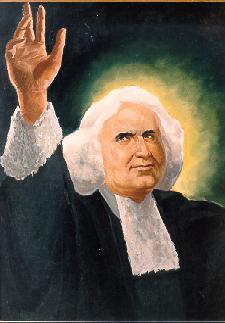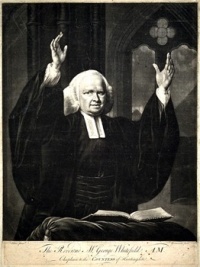
Though
Romans may be "
The Greatest Letter Ever Written", there are certainly portions of text that are hotly debated. We've
previously touched on all that predestination/election stuff in
chapters 8 and 9... But I was never aware of exactly how controversial the latter half of Romans 7 is for many people. Paul says:
For we know that the law is spiritual, but I am of the flesh, sold under sin. I do not understand my own actions. For I do not do what I want, but I do the very thing I hate. Now if I do what I do not want, I agree with the law, that it is good. So now it is no longer I who do it, but sin that dwells within me. For I know that nothing good dwells in me, that is, in my flesh. For I have the desire to do what is right, but not the ability to carry it out. For I do not do the good I want, but the evil I do not want is what I keep on doing. Now if I do what I do not want, it is no longer I who do it, but sin that dwells within me.
So I find it to be a law that when I want to do right, evil lies close at hand. For I delight in the law of God, in my inner being, but I see in my members another law waging war against the law of my mind and making me captive to the law of sin that dwells in my members. Wretched man that I am! Who will deliver me from this body of death? Thanks be to God through Jesus Christ our Lord! So then, I myself serve the law of God with my mind, but with my flesh I serve the law of sin. (Romans 7:14-25, ESV)
The question is, who is Paul referring to or illustrating here? And each option leads to some very different implications for this text on our life. Traditionally, people have offered three possible interpretations:
- This is a description of the non-Christian condition. Perhaps Paul is expounding to us the severity of the situation our friends and neighbors are living in. Within each of them is a moral law that they constantly find themselves struggling to meet or to simply suppress. Theirs is a struggle to relieve their conscience, either by better moral behavior - which never seems to satisfy - or by numbing themselves to the war inside their own being.
- This is a description of the pre-Christian condition. A significant nuance of the previous point: Maybe Paul is reminding us of the feelings we had when the Holy Spirit began the work of regeneration in our lives. Where we were in darkness, suddenly there was light and we were convicted of our sinfulness, the great schism that creates between God/us, as well as our need for salvation (John 16:8-15).
- Or, this could be a description of Paul's current experience as a Christian. In other words, perhaps Paul is communicating a vivid, albeit unpleasant, picture of his day-to-day struggles with sin even though he has been justified by through faith and experiences the Holy Spirit working within him.
While it is possible to construct arguments for any of these positions,
I think the only reasonable conclusion is that Paul is describing his current reality. Paul's vivid, troubling description of an almost dualistic struggle with sin is best understood as something he is experiencing as he writes to the Romans (though he is an Apostle) and as something he expects the Roman believers to identify within their own faith. I'd like to spend the rest of this post defending that view...
To me, there are three main data points that demand we read Romans 7 as describing the Christian experience.
1) The plain reading of the text clearly supports this view. Considering just verses 14-25, what is the writer of the text saying?
First off, everything is in the present tense: We know [now]... but I am [now] ... I see [now] ... making me captive [now]. Every sentence rings with the notion that the writer is describing something that is present reality for him. If Paul intended to describe something that
had happened to him, or that he
had experienced, it would've been easy enough to craft the message that way with a simple change of tenses. But Paul doesn't do that... He writes, as a redeemed Christian, about sin currently indwelling in him.
There is also nothing in the surrounding text that would cause us to read this passage as 'reflective' or rhetorical. Paul has just completed a careful argument in chapter 6 that, though we are no longer under the law, we should not use the grace we've received as a license to continue sinning (transgressing the law). The text of chapter 7 flows as part of the same argument, acknowledging that sin should not reign over us but is still something with which we need to contend.
Lastly, Paul was writing to address "those in Rome who are loved by God and called to be saints" (
1:7). The letter's intent was to unpack the doctrine of justification - by grace through faith alone - and enrich the understanding of those believers who would hear it. While there is little doubt that non-believers benefit from reading Romans, it is reasonable to assume Paul has his stated target-audience (namely the Church) in view unless he says otherwise.
2) Other texts support the plain reading of Romans 7. This is not the only place where Paul (or another Biblical author) speaks of the very real presence of sin in the life of a believer. Consider the struggle Peter had seeking approval from the Judiazers (
Galatians 2:11-14) or Paul's exhortation of the Colossians to pursue their sanctification "being renewed in knowledge after the image of [our] creator" (
Colossians 3:1-17). And let's not even talk about the temptations that regularly overcame the Corinthians...
Who among us hasn't been pricked by James' admonitions regarding the ever-ablaze tongue (
James 3:1-10)? Or Peter's call to make our calling and election sure through supplementing faith with virtue (
2 Peter 1:3-11)? Etc etc. The exhortations towards 'increased Godliness' that ring through the New Testament show that we still battle with sin. The character of that battle has changed completely, thanks to the Gospel... But, borrowing an illustration from Jerry Bridges, there is still a memory of sin's reign and an ingrained set of sinful habits rooted in our flesh that we must contend with.
3) If we're honest, our personal reality validates that sin is a present-tense struggle for us. Perhaps I should say that
I read what Paul is saying and can empathize completely with his struggle. Paul's illustration is very real and, frankly, a little too personally relevant for my liking.
I
do not understand my own actions. I can be reading the Bible one minute and in the next breath find my thoughts wandering into all kinds of wickedness. I
want to do the right things, and I even
know what those things are... But I find myself, almost in spite of my wants, wading out of the muck and mire - wondering how I managed to land back there again. Worse, there are plenty of times that I feel the war between holiness and flesh raging inside and find myself
willfully tipping the scales towards the thing I know is sinful - just because I want it more at that moment.
So, I
do find it true that every time I desire to do right I can be sure that sinful desires are whispering sweet nothings in my ear (
verse 21)... and I imagine that you do too.
Please Note: I started supporting my reading of
Romans 7:14-25 by appealing to the text itself (literally and contextually) and by drawing on corresponding passages in Scripture. The Scriptural case is compelling and sufficient, I think, in and of itself. My personal 'reality' is really not really important for interpretation here. However, I do mean to point out that, if we're honest with ourselves, we'd admit that the Holy Spirit gave Paul a pretty accurate description of our daily life. With that in mind, ignoring the plain reading of the text strikes me as a little silly.
Let's call it a wrap for today. Tomorrow, I'll try and harmonize
verse 14b - which is the real crux of the problem with interpreting Romans 7 like I'm suggesting. How are we "sold under sin" as Christians if Paul has just spent significant amounts of time explaining in chapters 5 and 6 that we're no longer under sin's reign?
A good question, and one we'll try to unpack tomorrow!
Labels: AWWR, Bible
 Holy and frequent meditation is another blessed means of keeping up a believer's walk with God. 'Prayer, reading, temptation, and meditation', says Luther, 'make a minister.' And they also make and perfect a Christian. Meditation to the soul, is the same as digestion to the body. For meditation is a kind of silent prayer, whereby the soul is frequently as it were carried out of itself to God, and in a degree made like unto those blessed spirits, who by a kind of immediate intuition always behold the face of our heavenly Father. None but those happy souls that have been accustomed to this divine employ, can tell what a blessed promoter of the divine life, meditation is.
Holy and frequent meditation is another blessed means of keeping up a believer's walk with God. 'Prayer, reading, temptation, and meditation', says Luther, 'make a minister.' And they also make and perfect a Christian. Meditation to the soul, is the same as digestion to the body. For meditation is a kind of silent prayer, whereby the soul is frequently as it were carried out of itself to God, and in a degree made like unto those blessed spirits, who by a kind of immediate intuition always behold the face of our heavenly Father. None but those happy souls that have been accustomed to this divine employ, can tell what a blessed promoter of the divine life, meditation is.



































